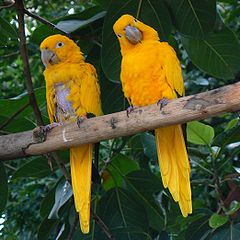Feather plucking is one of the most serious and commonly encountered parrot care concerns. Failure to provide parrots with a stimulating and socially appropriate environment will lead to a host of problems, including feather plucking.
Medical Aspects
The first step when confronted by a self-mutilating parrot is to rule out a medical disorder. Digestive system parasites, Psittacine Beak and Feather Disease and other ailments can lead a parrot to pluck its feathers.
A poor diet may also be at the root of the problem. Be sure to provide your veterinarian with a detailed description of the food consumed by your pet.
Social and Environmental Aspects
Knowing your pet’s history is vital, as the events that triggered feather plucking may have occurred in the distant past.
It is important to bear in mind that treating feather plucking is somewhat unlike curing a disease. Even with the best of care, parrots that have acquired this behavior may not relinquish it, and may resume plucking for no apparent reason. The care of such a bird requires a great deal of dedication and the input of an experienced veterinarian.
Sleep and Light
A common problem is sleep duration and quality. Most parrots hail regions where nights typically average 12 hours in length, yet a sleep period of such length is often difficult to provide in captivity. Consider where and for how long your parrot sleeps, and whether it is disturbed by noise or lights.
 The quality of daytime light is also vital to your parrot’s well-being. Be sure to use a UVA /UVB bulb over your pet’s cage.
The quality of daytime light is also vital to your parrot’s well-being. Be sure to use a UVA /UVB bulb over your pet’s cage.
Activity Levels
When I first began to observe parrots in the wild, I was struck by how active and engaged they remain throughout the day. Parrots suffer greatly when confined in bare cages, especially if a mate is not available. Foraging toys, large cages, or outdoor aviaries and a companion will help to prevent self-mutilation.
Hormones
Hormonal secretions, associated with seasonal changes and the onset of sexual maturity, may also stimulate feather plucking. This is especially likely if the bird is exposed to a light and temperature cycle that frequently changes, or is at odds with what the bird would experience in its natural habitat.
Parrots that are kept alone may also be stimulated to express mating behavior if stroked above the hips and under the wings by their owners. The stress of being unable to engage in normal mating behavior may bring on feather plucking.
Environmental Changes
Parrots are keenly attuned to their environments, and often respond negatively to change. New people, pets, noises, scents or similar factors may all play a role in your parrot’s behavior.
Parrots are noisy by nature…yelling at your bird when it feather plucks may actually encourage the behavior. Striking the cage or squirting water will only raise the bird’s stress level.
A Reader’s Experience
Blog reader Nicole was kind enough to write in recently concerning her Goffin’s cockatoo. A confirmed feather-plucker, the bird responded favorably when given the opportunity to bathe frequently. Nicole’s experience highlights the importance of experimentation and research when dealing with this troublesome issue.
Further Reading
A number of articles on our blog address parrot husbandry. For further information, please check out Providing the Proper Light to Pet Birds and Behavioral Enrichment for Parrots.
 That Bird Blog – Bird Care and History for Pet Birds
That Bird Blog – Bird Care and History for Pet Birds



 The quality of daytime light is also vital to your parrot’s well-being. Be sure to use a
The quality of daytime light is also vital to your parrot’s well-being. Be sure to use a